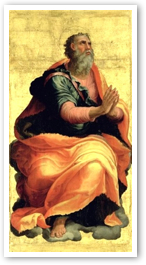The Fruit of Praising
- MOTHER MARY FRANCIS, P.C.C.
As love grows stronger, so does the desire to praise increase.
 |
It is always a sign of the weakening of love when we have less taste for praising a loved one. This is a good point of spiritual examen. If our love for God is growing less fervent and ardent, we have an inbuilt barometer to warn us. It registers less concern for praising him. No, it is definitely not a rather bleak activity for all eternity, simply to praise. For one thing, the more we love a human being, and certainly the more we grow in the love of God, the more do we see to praise.
The person who loves very little does not see much to praise in the other. Again, this is a test of our charity. If we do not observe much to praise in our neighbor, one thing is certain: we do not know him well enough, love him well enough. If we come to love him more, we shall have our own reward of seeing more and more to praise. The heart that loves little always sees little or perhaps even nothing to praise. The heart that loves much will see something to praise where others may not. But there are qualities and characteristics of praise.
Praise is always humble. This is prominently its very first attribute, because in praising another we in some way situate ourselves below that person. Praise of its nature exalts the one praised, sets this respected person or this dear God or this loved friend above the one praising. By the mere act of praising, we assume a position of humility. We take a willing stance beneath another person.
 This is J. Fraser Field, Founder of CERC. I hope you appreciated this piece. We curate these articles especially for believers like you.
This is J. Fraser Field, Founder of CERC. I hope you appreciated this piece. We curate these articles especially for believers like you.
Please show your appreciation by making a $3 donation. CERC is entirely reader supported.

Acknowledgement
Mother Mary Francis, P.C.C. "The Fruit of Praising." excerpt from Anima Christi: Soul of Christ (San Francisco, Ca: Ignatius Press, 2001).
Reprinted with permission from Ignatius Press.
The Author

 Mother Mary Francis, P.C.C. (1921-2006) was the abbess of the Poor Clare Monastery in Roswell, New Mexico. She was an accomplished author and writer of thirteen books, seven plays, and numerous poems. Among her books are: Come, Lord Jesus: Meditations on the Art of Waiting, But I Have Called You Friends: Reflections on the Art of Christian Friendship, A Right to Be Merry, Anima Christi, and Forth and Abroad. During her life she helped found four new Poor Clare monasteries, including one in Holland, and led the restoration of two others.
Mother Mary Francis, P.C.C. (1921-2006) was the abbess of the Poor Clare Monastery in Roswell, New Mexico. She was an accomplished author and writer of thirteen books, seven plays, and numerous poems. Among her books are: Come, Lord Jesus: Meditations on the Art of Waiting, But I Have Called You Friends: Reflections on the Art of Christian Friendship, A Right to Be Merry, Anima Christi, and Forth and Abroad. During her life she helped found four new Poor Clare monasteries, including one in Holland, and led the restoration of two others.


